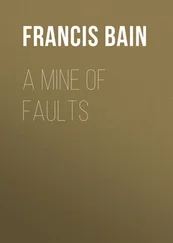Francis Bain - The Ashes of a God
Здесь есть возможность читать онлайн «Francis Bain - The Ashes of a God» — ознакомительный отрывок электронной книги совершенно бесплатно, а после прочтения отрывка купить полную версию. В некоторых случаях можно слушать аудио, скачать через торрент в формате fb2 и присутствует краткое содержание. Жанр: foreign_antique, foreign_prose, на английском языке. Описание произведения, (предисловие) а так же отзывы посетителей доступны на портале библиотеки ЛибКат.
- Название:The Ashes of a God
- Автор:
- Жанр:
- Год:неизвестен
- ISBN:нет данных
- Рейтинг книги:5 / 5. Голосов: 1
-
Избранное:Добавить в избранное
- Отзывы:
-
Ваша оценка:
- 100
- 1
- 2
- 3
- 4
- 5
The Ashes of a God: краткое содержание, описание и аннотация
Предлагаем к чтению аннотацию, описание, краткое содержание или предисловие (зависит от того, что написал сам автор книги «The Ashes of a God»). Если вы не нашли необходимую информацию о книге — напишите в комментариях, мы постараемся отыскать её.
The Ashes of a God — читать онлайн ознакомительный отрывок
Ниже представлен текст книги, разбитый по страницам. Система сохранения места последней прочитанной страницы, позволяет с удобством читать онлайн бесплатно книгу «The Ashes of a God», без необходимости каждый раз заново искать на чём Вы остановились. Поставьте закладку, и сможете в любой момент перейти на страницу, на которой закончили чтение.
Интервал:
Закладка:
This old Sanskrit language, then, in which dwells the spirit of a classic paganism not less beautiful, and holier than Hellas, pre-Christian, idolatrous,[ 3 3 The observations of Mr. Theophilus G. Pinches, on the means by which, in ancient Babylon, "an enlightened monotheism and the grossest polytheism could, and did, exist side by side," apply accurately to India. ( The Old Testament in the Light of the Historical Records of Assyria and Babylonia , p. 10.)
] preserves among other things opposed to Western modernism an element of charm, which in Europe too much knowledge is destroying: the element of distance, of the unknown, of that which is outside the map, beyond, afar. For us, the time is gone, when, as Plutarch says, geographers filled up the emptinesses beyond the limits known with bogs or deserts or wild beasts. But Hindoo stories move in an enchanted land, a thing to dream over like "the world as known to Homer," or the scraps of mythological geography in Pindar's Odes, when, for example, Rhodes was not an island, but lay lurking, before the gods divided earth, in the briny hollows of the sea.[ 4 4 Olymp. vii.
] And as we pore on it, we feel ready to murmur with Voltaire, that error has its worth as well as truth. Did the discovery of America make up for the lost mystery that brooded like the spirit over the waters of the dim Atlantic, when even Hibernia was half a myth, ultra quam ad occasum nulla invenitur habitabilis terra, nisi miranda loca quæ vidit S. Brandanus in Oceano ?[ 5 5 Apud Bocharti Phaleg . p. 184.
] The old literature of India, its epics and itihases , are the very home of mythical geography, of lotus lands, white islands, seas of milk, and distant hills behind which, far beyond the sea, the suns go down to die, which never even Sindbad saw. It is all one gigantic dream, fairy tale reduced to a kind of system, where wild imagination is reality, and the commonplace is not. Teach the Hindoo the earth goes round the sun; it may be so: but in his heart there echoes some scrap of ancient poetry, where every sun descends to rest behind the western hill. Would you blame him for choosing rather to err with Kálidás and Walmiki, than go right with some elementary manual of geography? For him, the dream is the reality; and the spell is in the language in which these things are written: who does not know the language cannot understand the spell. Your Mill[ 6 6 James Mill's criticism of the Indian ethic is a criminal offence, a sin against literature. The coryphæus of the Inductive Philosophy, dogmatising on a language of which he could not even read a single word!
] and your Macaulay argue on these matters like blind men reasoning on colour. Only that grows never old, which never lived. You cannot kill a dream, because it is already dead.
Down in the west of England, on the very edge of the sea, I know a hill, which had it been in India, pagan India, would have been sacred long ago to the Daughter of the Snow; so exactly does its giant sweep of smooth green turf resemble the outline of a colossal woman's breast. And there on a yellow evening, I lay and mused. And I said to my own soul: This is not quite the golden glow of my Indian Eve, for it is just a little chilly; and yet, yonder is a hill worthy to be haunted by Párwati herself. Only the flowers would all be strange to her; for certainly she would not recognise these primroses and buttercups, this gorse. And yet, some things might deceive her; for surely she would take Lundy Island for the very western mountain, behind which at this very moment the sun is going down.
And as I pondered on her and her husband, all at once I exclaimed: O Wearer of the Moony Tire, who art thyself the Past, the Present, and the Future, didst thou for all thy knowledge of Time's secrets ever dream, that one day thy worshippers would all fall under the direction of this misty little island in a far-off northern sea? Was it irony in the Creator, who makes and ruins even worlds in sport, to subject thy dreaming millions to the Western men of business, less like them than any other people on the surface of the earth? Had India's gods deserted her, as once Judæa's did, or wert thou buried in a thousand years of Yóg, when the Moguls and Maráthas, the Clives and the Dupleix were fighting for the heavy crown glittering with barbaric pearl and gold? And yet, what use in asking, since doubtless thou art far away among thy own Himálaya's still undiscovered snows.
And as I spoke, I looked, and lo! there before me was the almost imperceptible Digit of the Moon, hanging low in the evening sky just over Lundy Island and the sea. And instantly I exclaimed: Aha! Maheshwara, I was wrong, and I utterly forgot thy quality of universal presence, for sure I am that where thy Digit is, thou art thyself not far away. So then tell me, was it thy wish to punish thy devotees, or was it by thy negligence they fell? And what shall be the end?
And as I gazed upon the Moon, I heard the laughter of the deity in the thunder of the waves. And presently he said: Foolish Western, there are many other things thou hast forgotten, as well as my ubiquity. Dost thou not remember what one of thy own philosophers has said: [Greek: Theòs anaítios, aitía d heloménou]? Or hast thou actually forgotten the wisdom of all my own old Hindoo sages, that thou wouldst saddle the responsibility for the ripening of the fruit of works, on me? As my people's works have been, so is their condition: they are but gathering the fruit of the tree of their own wrong-doing in a previous existence. And the crimes of a former birth dog them like death, and lie on them like a shadow: they only have themselves to blame, and now there is no help for it, but in themselves. And they must work out their own emancipation, not by petulance and violence, but by penance and austerity.
Читать дальшеИнтервал:
Закладка:
Похожие книги на «The Ashes of a God»
Представляем Вашему вниманию похожие книги на «The Ashes of a God» списком для выбора. Мы отобрали схожую по названию и смыслу литературу в надежде предоставить читателям больше вариантов отыскать новые, интересные, ещё непрочитанные произведения.
Обсуждение, отзывы о книге «The Ashes of a God» и просто собственные мнения читателей. Оставьте ваши комментарии, напишите, что Вы думаете о произведении, его смысле или главных героях. Укажите что конкретно понравилось, а что нет, и почему Вы так считаете.












